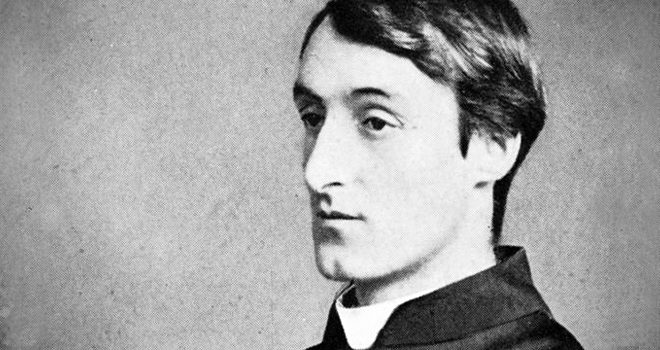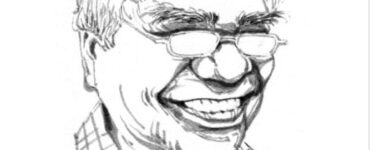(verses 16-18)
One stirred from the rigging to save
The wild woman-kind below,
With a rope’s end round the man, handy and brave—
He was pitched to his death at a blow,
For all his dreadnought breast and braids of thew:
They could tell him for hours, dandled the to and fro
Through the cobbled foam-fleece, what could he do
With the burl of the fountains of air, buck and the flood of the wave? 16
“One”,a nameless sailor; and “womankind”,not any woman. Kind has a two way reference,the generality of women, and the kind chivalrous sailor who was moved by the wailing of the women
One stirred. The rest were too petrified even to stir. And he stirred, for he couldn’t remain still, remain unmoved at the terrible tragedy . He was moved by the wild wailing of women in panic. He wanted to do to something to rescue them. He could have saved himself by holding himself on the rigging, [the equipment such as wire rope,jacks used with cranes and other lifting equipment ]. But he dared death. He was brave and full of muscular power, (“dreadnought breast and braids of thew”. Thew” is an old English term for muscle and sinew. ) He dandled perilously in the stormy wind. The others on the deck were counting hours as he was hanging in the fleece- like foam. He was their last hope, dangling in the foam. The sailor’s bravery was as rare as his sense of sacrifice. But are these enough?
The next verse introduces a lioness, the tall nun of the tale.
They fought with God’s cold—
And they could not and fell to the deck
(Crushed them) or water (and drowned them) or rolled
With the sea-romp over the wreck.
Night roared, with the heart-break hearing a heart-broke rabble,
The woman’s wailing, the crying of child without check—
Till a lioness arose breasting the babble,
A prophetess towered in the tumult, a virginal tongue told. 17
The previous verse spoke of “one ” exemplary sailor who “stirred’ to save the wailing women, but could not succeed against the combined fierceness of water and wind, ( “Fountains of air”.) For it was a fight with “God’s cold ”. Fail he must for his was just manly power, (” handy and brave”.) The passengers either fell to the deck and got crushed,or were drowned.Women wailed, children cried, and the “night roared” too ,as if in sympathy. Neither the bravery of the sailor nor the pitiful wailing could avert the tragedy.
More than just manly power and bravery of man is called for. And the call was taken by a woman, a lioness of a nun.The answer to the storm is not manly power. It called for the courage of a woman. It called for not love of man,but love of something more than man or woman .Chivalry is not sufficient. The nun, “a lioness”, arose “breasting the babble”. And she rose like a tower ( “A prophetess towered”).The Tower of Babel is recalled. The voice of the nun towered above the Babel ( “rabble” ) . The voice of a prophetess was heard,(“a virginal tongue told”) . “Told ” has a dual signification.It has a resonance to the bell told to announce death, which is the immediate context. But it also resonates , more significantly,with the Word as Christ.
The Biblical references to the Word are quite well known:
“In the beginning was the Word, and the Word was with God, and the Word was God.’
(John 1:1)
“Jesus is the Word because through him all things are made,” (Jonathan, 8. )
There is T.S.Eliot’s allusion to Christ the child swaddled :
“The word within a word, unable to speak a word,
Swaddled with darkness. In the juvescence of the year
Came Christ the tiger “(Gerontion)
Hopkins too,like Eliot,must have had in mind the sermon preached by Lancelot Andrewes before King James I on Christmas Day, 1618:
“Verbum infans, the Word without a word; the eternal Word not able to speak a word; a wonder sure and . . .swaddled; and that a wonder too. He that takes the sea “and rolls it about the swaddled bands of darkness…”
This sermon of Andrews deals with the particular theme of Christmas–the Incarnation.And it is relevant here because the nun’s “word” (“a virginal tongue told” ) is indeed a reference to “Verbum infans, the Word without a word…swaddled”(Lancelot Andrews).For Hopkins is suggesting that the tall nun on the deck is reenacting the immaculate conception of Virgin Mary, and the giving birth to Christ the Word “swaddled bands of darkness.”
The Word rises above the rabble of the wailing world, above the Tower of Babel.
The opening line of the verse significantly reminds us of God’s presence, evening in terrible adversity (“They fought with God’s cold—”).Cold, literally and metaphorically. In the terrible tragedy the poet sees God’s presence, not Satan’s.
The tall nun introduced in this verse is one of the five Franciscan nuns on board who were drowned on that tragic night. She is introduced in the poem at the midpoint of the narrative, verse 17 of the 35 verse poem. It turns the reader’s attention to the subtitle of the poem: “To the happy memory of five Franciscan Nuns, exiles by the Falk Laws drowned between midnight and morning of Dec. 7th. 1875.” The tragedy of the wreck turns a “ happy memory’. And how? But the poet takes a short break, and turns, or returns,to himself. After all the poem is not about what happened to the crew, nuns among them, but what it means to the poet,and thus, to us.
***
18. Ah, touched in your bower of bone
Are you! turned for an exquisite smart,
Have you! make words break from me here all alone,
Do you!—mother of being in me, heart.
O unteachably after evil, but uttering truth,
Why, tears! is it? tears; such a melting, a madrigal start!
Never-eldering revel and river of youth,
What can it be, this glee? the good you have there of your own? A pain close to pleasure.
The poet puts himself in the place of the common man for whom it is news, though tragic news. One reads the report, sheds a tear or two, and goes about one’s daily evil routine,( “O unteachably after evil ”) . Man runs to his evil ways, untaught by the terrible tragedies he watches. Every tragedy has a lesson to teach, if only one is willing to be taught. Or, man tries to make poetry ,as Hopkins is doing, sitting in the comfort of St. Bueno’s College in Wales, ( “make words break from me here all alone”. A little later in the poem, in verse 24,he refers to this contrast between the danger in the sea and the safety his place:
“. . . I was under a roof here, I was at rest,
And they the prey of the gales;” (v.24)
However, in this poem, the poet’s is not just an indulgence in self-reproach, or mere condemnation of the insensitivity of the generality of men and women. It is a just recognition of the presence of the conflict between the two. Hopkins does grieve like a mother at the tragedy , “mother of being in me, heart”. Hopkins is indeed speaking out his heart, “uttering truth”. It is not just tears, but “ a melting”, into poetry ( “a madrigal start”). It pours out like “Never-eldering revel and river of youth”. And it is not on a tragic note, but a note of “glee? the good you have there of your own? A pain close to pleasure.”( “The happy memory” of the subtitle.) Does not Shelley sing of the sweetest songs that tell us of the saddest thoughts?
***
Titbit:
“I mean the art or virtue of saying everything right to or at the hearer, interesting him, holding him in the attitude of correspondent or addressed or at least concerned, making it everywhere an act of intercourse—and of discarding everything that does not bid, does not tell.” ( Hopkins, about his theory of “bidding”:)









Add comment